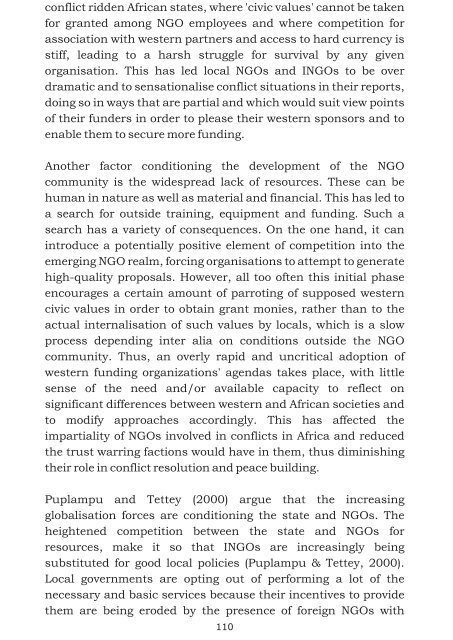Beneficiaries are actors too.pdf - Southern Institute of Peace ...
Beneficiaries are actors too.pdf - Southern Institute of Peace ...
Beneficiaries are actors too.pdf - Southern Institute of Peace ...
Create successful ePaper yourself
Turn your PDF publications into a flip-book with our unique Google optimized e-Paper software.
conflict ridden African states, where 'civic values' cannot be taken<br />
for granted among NGO employees and where competition for<br />
association with western partners and access to hard currency is<br />
stiff, leading to a harsh struggle for survival by any given<br />
organisation. This has led local NGOs and INGOs to be over<br />
dramatic and to sensationalise conflict situations in their reports,<br />
doing so in ways that <strong>are</strong> partial and which would suit view points<br />
<strong>of</strong> their funders in order to please their western sponsors and to<br />
enable them to secure more funding.<br />
Another factor conditioning the development <strong>of</strong> the NGO<br />
community is the widespread lack <strong>of</strong> resources. These can be<br />
human in nature as well as material and financial. This has led to<br />
a search for outside training, equipment and funding. Such a<br />
search has a variety <strong>of</strong> consequences. On the one hand, it can<br />
introduce a potentially positive element <strong>of</strong> competition into the<br />
emerging NGO realm, forcing organisations to attempt to generate<br />
high-quality proposals. However, all <strong>too</strong> <strong>of</strong>ten this initial phase<br />
encourages a certain amount <strong>of</strong> parroting <strong>of</strong> supposed western<br />
civic values in order to obtain grant monies, rather than to the<br />
actual internalisation <strong>of</strong> such values by locals, which is a slow<br />
process depending inter alia on conditions outside the NGO<br />
community. Thus, an overly rapid and uncritical adoption <strong>of</strong><br />
western funding organizations' agendas takes place, with little<br />
sense <strong>of</strong> the need and/or available capacity to reflect on<br />
significant differences between western and African societies and<br />
to modify approaches accordingly. This has affected the<br />
impartiality <strong>of</strong> NGOs involved in conflicts in Africa and reduced<br />
the trust warring factions would have in them, thus diminishing<br />
their role in conflict resolution and peace building.<br />
Puplampu and Tettey (2000) argue that the increasing<br />
globalisation forces <strong>are</strong> conditioning the state and NGOs. The<br />
heightened competition between the state and NGOs for<br />
resources, make it so that INGOs <strong>are</strong> increasingly being<br />
substituted for good local policies (Puplampu & Tettey, 2000).<br />
Local governments <strong>are</strong> opting out <strong>of</strong> performing a lot <strong>of</strong> the<br />
necessary and basic services because their incentives to provide<br />
them <strong>are</strong> being eroded by the presence <strong>of</strong> foreign NGOs with<br />
110


